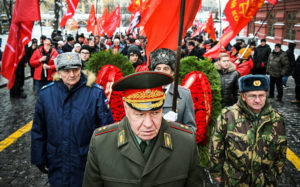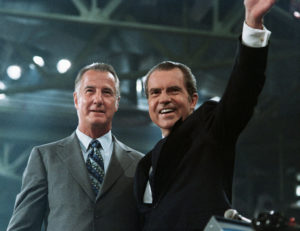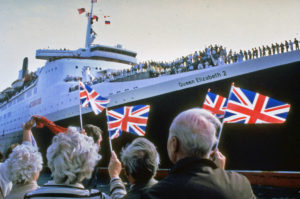In the course of his troubled presidency, Richard Nixon spoke 14 times to the American people about the war in Vietnam. It was in one of those speeches that he coined the phrase “the silent majority”, while others provoked horror and outrage from those opposed to America’s longest war. But of all these televised addresses, none enjoyed a warmer reaction that the speech Nixon delivered on 23 January 1973, announcing that his Secretary of State, Henry Kissinger, had achieved a breakthrough in the Paris peace talks with the North Vietnamese.
At last, Nixon said, the war was over. At a cost of 58,000 American lives and some $140 billion, not to mention more than two million Vietnamese lives, the curtain was falling. The last US troops would be brought home. South Vietnam had won the right to determine its own future, while the Communist North had pledged to “build a peace of reconciliation”. Despite the high price, Nixon insisted Americans could be proud of “one of the most selfless enterprises in the history of nations”. He had not started the war, but it had dominated his presidency, earning him the undying enmity of those who thought the United States should just get out. But the struggle had been worth it to secure “the right kind of peace, so that those who died and those who suffered would not have died and suffered in vain”. He called it “peace with honour”.
Fifty years on, Nixon’s proclamation of peace with honour has a bitterly ironic ring. As we now know, much of what he said that night was misleading, disingenuous or simply untrue. South Vietnam was in no state to defend itself, and collapsed just two years later. The North Vietnamese had no intention of laying down their weapons, and resumed the offensive within weeks. And Nixon and Kissinger never seriously thought they had secured a lasting peace. They knew the Communists would carry on fighting, and fully intended to intervene with massive aerial power when they did. But then came Watergate. With Nixon crippled, Congress forbade further intervention and slashed funding to the government in Saigon. On 30 April 1975, North Vietnamese tanks crashed through the gates of the presidential palace, and it really was all over.
Half a century later, have the scars of Vietnam really healed? It remains not only America’s longest war but one of its most divisive, comparable only with the Civil War in its incendiary cultural and political impact. The fundamental narrative trajectory of the late Sixties — the turn from shiny space-age Technicolor optimism to strident, embittered, anti-technological gloom — would have been incomprehensible without the daily images of suffering and slaughter on the early evening news. It was Vietnam that destroyed trust in government, in institutions, in order and authority. In 1964, before Lyndon Johnson sent in combat troops after the Gulf of Tonkin incident, fully three-quarters of Americans trusted the federal government. By 1976, a year after the fall of Saigon, not even one in four did so.
It was in the crucible of Vietnam, too, that you can spot many of the tensions that now define American politics. Perhaps the most potent example came in May 1970, after Nixon invaded nominally neutral Cambodia to eliminate the North Vietnamese Army’s jungle sanctuaries. First, on 4 May, four students were shot and killed by the National Guard during a demonstration at Kent State University, Ohio. Then, on 8 May, hundreds more students picketed outside the New York Stock Exchange, only to be attacked by several hundred building workers waving American flags.
The “hard hat riot”, as it became known, was the perfect embodiment of patriotic populist outrage at what Nixon’s vice president, leading bribery enthusiast Spiro Agnew, called “the nattering nabobs of negativism…an effete corps of impudent snobs who characterise themselves as intellectuals”. Today it seems almost predictable, just another episode in the long-running culture wars. But at the time it seemed genuinely shocking. And with his brilliantly ruthless eye for a tactical advantage, Nixon saw its potential. When he invited the construction workers’ leaders to the White House two weeks later, he knew exactly what was doing. “The hard hat will stand as a symbol, along with our great flag,” he said, “for freedom and patriotism and our beloved country”.
Even now, many Americans prefer to forget how the war ended. Yet even in that story, there are any number of hints of what was to come. Take what happened to the South Vietnamese — more than a million in total — who fled to the United States in the aftermath of defeat. At first, many were housed in air bases and army barracks. But polls showed that most of their new neighbours resented them and wanted them gone. In the inaptly named town of Niceville, Florida, where more than a thousand Vietnamese refugees were quarantined at Eglin Air Force Base, eight out of ten people said they wanted them out. “Gooks Go Home” read placards in Arkansas. “They can’t speak English,” said one Los Angeles carpenter, “and they will be on welfare before they get off the airplane. And who pays for that? We do.”
Perhaps it’s easy to understand why so many people resented the new arrivals. Times were hard, the American economy was in recession, and unlike previous waves of refugees, the South Vietnamese were symbols of defeat, reminders of a uniquely humiliating, agonising chapter in the nation’s recent history. Even on the Left, there was remarkably little sympathy for them.
Unbelievable as it may seem today, the bloody collapse of South Vietnam — which saw thousands of former American allies executed or imprisoned for years in Communist concentration camps — provoked an outpouring of joy among elements of the old peace movement. On 11 May 1975, not two weeks after Saigon’s fall, some 50,000 people gathered to celebrate in Central Park, for what one reporter called “a joyous all-day carnival of songs and speeches in the perfect sunshine”. Two Democratic congresswomen, Elizabeth Holtzman of Brooklyn and Bella Abzug of Manhattan, delivered rousing speeches, and there were songs from Pete Seeger, Joan Baez, Paul Simon and other veterans of the good old days. “There’s a lot of lumps in a lot of throats,” one onlooker told reporters. “It’s unbelievable. Today is the first day I really realise the war is over.” You would scarcely have believed that the Americans had lost. Or perhaps you would.
For most Americans, however, the overwhelming emotions were humiliation, sadness, and guilt. “I thought that we did a really miserable job for those people,” said Thomas Polgar, the CIA chief in Saigon, “and they would have been much better off if we had never gone there in the first place.” Indeed, some decided not only that American intervention in Vietnam had been a mistake, but that all interventions abroad must be illegitimate or misguided. American isolationism has a long history, but never has it enjoyed a bigger boost than it did in the early Seventies.
Around the world, too, America’s image had taken a horrendous battering. Asked for their reactions to the defeat in Vietnam, the British historian Jack Plumb mourned “the diminution of America to human size”, the Dutch critic Rob Kroes thought the United States was “losing its magnetism”, and the French sociologist Michel Crozier declared that America was no longer “a touchstone for other societies”. And for perhaps the first time, even instinctively pro-American commentators began to wonder — as they still do today — whether the nations of Europe should prepare for life without the shield of their most powerful ally. “For 20 years we have enjoyed a golden age of security under the American umbrella,” said the Daily Mail. “Now we must start learning to take care of ourselves.” That was almost half a century ago. What’s changed?
The irony, of course, is that the war really had been all for nothing. Henry Kissinger always insisted that the struggle had been essential to stop the advance of Communism in south-east Asia. But the domino theory turned out to be nonsense. Vietnam and Cambodia both fell to Communism, but instead of the dominoes tumbling in rapid sequence, they promptly started fighting one another. Then the Chinese got stuck in, too. Today Vietnam is still ruled by the autocratic Communist Party; yet it’s also a rapidly growing globalised economy with high inequality, high corruption and an unhealthy dependence on Western tourism.
As for the United States, it takes more than 50 years for such a traumatic defeat to fade. The deepest scars, naturally, belong to those who suffered most. “I came home from the war with the curious feeling that I had grown older than my father, who was then 51,” writes Philip Caputo in the preface to his memoir A Rumor of War. “A man saw the heights and depths of human behaviour in Vietnam, all manner of violence and horrors so grotesque that they evoked more fascination than disgust. Once I had seen pigs eating napalm-charred corpses — a memorable sight, pigs eating roast people.”
But there’s a case, too, that the shock of defeat fundamentally distorted American politics. It’s a misconception that the “Vietnam syndrome” made the United States less likely to embark on foreign crusades. The truth is surely quite the reverse: successive presidents were desperate to wipe away the stain. Would Ronald Reagan have sent US troops into the sideshow of Grenada in 1983, had it not been for his eagerness to show that he could succeed where John F. Kennedy, Lyndon Johnson and Nixon had failed? Would George Bush senior have gone into Panama? Would the younger Bush have been quite so quick to assert his nation’s virility in Afghanistan and Iraq, had he not spent his college years during the height of the Vietnam War, when every night brought new footage of America’s travails in the jungle? Perhaps the answer in each case is still yes, because intervention is an inevitable consequence of wealth and power. But it’s surely worth asking the questions.
Even the most recent presidents have been haunted by Vietnam. Barack Obama once called the treatment of Vietnam veterans “a mistake that must never be repeated”, and it’s pretty obvious that he was talking about the wider war, too. Indeed, his foreign policy mantra — “Don’t do stupid shit” — could hardly be a better encapsulation of the post-Vietnam mindset, which explains his reluctance to get involved in Syria. Joe Biden, too, is a post-Vietnam politician: one of his first major votes as a young senator in 1975, for example was to cut off funding to South Vietnam just days before the fall of Saigon.
But there is, of course, an exception — a recent American president who didn’t serve in Vietnam because he avoided the draft five times, and never really wrestled with its moral and strategic dilemmas because he always knew it was a terrible idea. He never really understood why other young men bothered going, he once said. “What did they get out of it?” And perhaps Donald Trump can be forgiven for not taking Vietnam seriously, because he had bigger things to worry about. He never felt guilty about ducking the war, he told Howard Stern, because “we have our own Vietnam — it’s called the dating game”. Dating was genuinely perilous, he explained, because of the risk of sexually transmitted diseases. Indeed, women’s vaginas were “potential landmines…there’s some real danger there”.
Some people might consider this a remarkable analogy. But the 45th President felt blessed to have come through unscathed. “It’s amazing, I can’t even believe it,” he mused. “I’ve been so lucky… It is my personal Vietnam. I feel like a great and very brave soldier.”
You’ll never think of Apocalypse Now in the same way again.
Disclaimer
Some of the posts we share are controversial and we do not necessarily agree with them in the whole extend. Sometimes we agree with the content or part of it but we do not agree with the narration or language. Nevertheless we find them somehow interesting, valuable and/or informative or we share them, because we strongly believe in freedom of speech, free press and journalism. We strongly encourage you to have a critical approach to all the content, do your own research and analysis to build your own opinion.
We would be glad to have your feedback.
Source: UnHerd Read the original article here: https://unherd.com/




